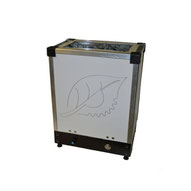Efficient Insect Oviposition Harvest With Brushing Machine
In insect rearing facilities, e.g. mosquito laboratories, females are often allowed to oviposit (i.e. lay eggs) in rearing cages on moist (sterilised) paper strips such as paper towels, seed germination paper or crepe paper (see below for details on oviposition paper properties). Typically, after the paper has dried, the insect eggs are collected by laboratory staff - using fine brushes to manually brush the eggs / oviposit from the 'egg papers' into containers for maturation. However, this process is very time-consuming and therefore not suitable for high-throughput insect mass rearing and research facilities.
VSI IR-502 Oviposition Brushing Machine

IR-502 Oviposition Brushing Machine, for automatic, gentle and efficient collection of adherent (mosquito) eggs from oviposition paper strips. Automatic oviposition harvesting with the IR-502 involves the gradual introduction of creped oviposition paper strips between two counter-rotating barrels equipped with brushes. The speed of the brushes is variable. The insect eggs are then collected in a removable bottom tray. The design allows easy cleaning of all parts after removal of the housing. The brush barrels can be maintained by the user or replaced if necessary. The IR-502 is a simple, user-friendly device that significantly reduces the time spent collecting insect eggs in insect research and mass rearing environments.
IR-502 Features
- Fast, cost-effective insect ovideposit egg collection
- Gentle brushing of oviposition paper between counter-rotating barrels with brushes, stepless adjustable brush speed
- Convenient insect egg collection tray
- Detachable housing for easy cleaning of interior
- User changeable brush barrel
Options:
- Select other ovideposit brushes (lengths, rigidity, etc.)
- Factory adjust brush barrel length to fit different (i.e. wider, longer) oviposition paper sizes
General Properties of Oviposition Paper Strips

Oviposition egg strips are designated strips of paper used to collect insect eggs. These strips are usually made of creped / filter paper or other porous materials that allow female insects to lay their eggs on them. The strips are placed in the insect's habitat or breeding area in insect / mosquito rearing cages, and female insects are attracted to lay their eggs on the paper rather than on other surfaces. In rearing cages, moistened oviposition paper also serve as a water source.
- While largely depending on species-specific preferences, some general benefitial characteristics of oviposition paper strips for insect egg collection include: ... Continue reading
-
- Porosity: The paper strips should be porous enough to allow female insects to lay their eggs on them, but not so porous that the eggs fall through the paper or cannot be removed easily by brushing.
- Durability: The paper strips should be durable enough to withstand handling and transport without tearing or breaking. This is particular importent when strips are wetted over an extended period as in misquito rearing cages.
- Size: The size of the ovideposit paper strips should be appropriate to the size of the insect, and the numbers of insects and thus the number / volume of eggs expected to be laid.
- Attractiveness: The paper strips should be attractive to female insects and their colour, texture and scent can be adjusted to suit the preferences of specific insect species . or at least should not repel them.
- Non-toxic: The paper strips should be non-toxic and free from substances that could harm eggs or subsequently developing larvae (e.g. in larvae rearing trays).
- Sterile: For certain applications, the paper strips should be sterile to prevent contamination of the eggs with micro-organisms. However, rearing conditions often inevitable result in some contamination of paper strips, thus, regular harvest of eggs is key for high hatching rates.
- Cost-effectiveness: The paper strips should be inexpensive and easy to obtain in large quantities for mass rearing settings with expected large amounts of egg collection. Here, automation can further reduce the labour costs of egg collection, requiring oviposition papers of an appropriate size (i.e. not too small, short) to be fully effective for automated insect egg ovideposite brushing machines such as the VSI IR-502.
| References | Insect Oviposits / Mosquito Egg Collection | OPEN |
|
||
The Oviposition Bushing Machine is particularly useful in large rearing facilities that operate multiple rearing / oviposition cages and harvest eggs routinely.







